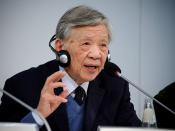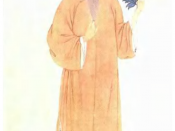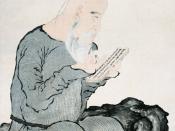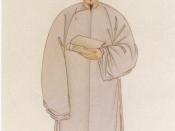In a bustling Chinese port town, people run about the crowded streets like lab rats trying to find the prized cheese at the end of the maze. People stop occasionally to haggle over the price of a small bushel of bak choy or to bow there heads to an acquaintance they meet long ago and forgotten their name. Towards the center of the town stood a two-story building made of a mixture of dark wood and harden clay. This fine establishment is nothing more than a teahouse well know for its scholarly clientele A dignified man steps outside and unfolds his fan to direct a gentle breeze in his direction. As he turns to head in another direction, he notices a man approaching him. �gWhy it�fs my good friend Yuan Mei! How are you and your fine students doing?�h Reluctant to speak Yuan Mei folds his fan and slams it into his other hand.
�gI am fine as always my friend. As for my students they are making me proud.�h The two gazed at each other of a moment. �gWell I shall continue to wish for your safety and health. I must now go meet my companions for a round of tea.�h �gI too must be heading off.�h The two men went there separate ways but tension continued to reside within both of them.
From Zhang Xeucheng�fs Fu Xue, such tension could be felt in his words toward the �gother�h view on proper roles for educated women. Yuan Mei and Zhang Xeucheng seem to have been rivals on the role of educated women. Even though both of them believed in the intellectual abilities of women and promoted further women rights, their belief on proper roles of an educated woman differed greatly. Due to personal experiences and beliefs, each scholar developed his own perspective on behavior and utilization of education for women.
Yuan Mei believed that anyone could be educated and create extravagant works of work as long as inspiration and desire existed within the individual. This included women despite contemporary belief of the time. There was a strong belief that women had no need of an education and need only to complete household chores or any other jobs inside the house. Women�fs writing was thought to be inferior to literary works of men. To prove his theory, he took in several female students that later became well known Chinese writers. This was seen by others such as Zhang Xuecheung to be a boastful act. By taking in female students and to say that their work was equal to those of men, Yuan Mei set himself up to be ridiculed as a man only seeking fame and flaunting his skills by producing extraordinary female writers some of which were already accomplished poets. This could not be more evident when reading �gJin Xianxian nushi mu zhiming.�h In this epitaph for Jin Xianxian, there were several instantances were he boasts of his own work. �gAs for poetry, Xianxian was well read in the masters of the Tang and Song, and was especially fond of my own poetry.�h The paragraph goes on to state how Xianxian was so obsessed with his poetry she immediately wanted to be his student.
Yuan Mei believed that women needed to elevate their status above tradition housework. Believing that �g.. a woman with talent .. to be ill-fated,�h he thought that if women had not been so bounded by the confines of the home, it would not be so tragic. Since they were married at such a young age and then were shackled to their new homes, they have little time to develop their literary skills or discuss works of art with others.
Zhang Xuecheng did not believe that women were so ill fated. Having been the only son in a large family and educated by his mother, he believed that women were as capable as men of but women had to abided by the �gboundaries of ritual conduct.�h In certain times in history, women were responsible in transcribing history that would otherwise be lost. This showed that women had an extremely important role in the past. Zhang was a philosopher of history and so analyzed women�fs learning in the past to understand the current situation of women in the present. His research showed that women had always wrote and published great literary works of art such as �gDiary of Work and Rest�h. Zhang continues to back his argument by listing several notable wives of great men. These wives had achieve some sort of literary merit and yet continued to maintain their virtues.
Zhang attacks Yuan Mei�fs interpretation of poems in the Book of Odes saying that poems of young women should not be compared to those of learned men. Yuan Mei believed that the untainted love of a young woman could produce such beautiful poetry that learned men could not create. Zhang rebutted this by saying that these two kinds of poems or completely different and should not be compared. Men�fs poetry on the surface is filled with sentiments, aroused passion and loose expressions, but a deeper analyzes show that in fact the purpose was to criticize society or government. Women writing seem to contain proper language despite personal characteristics. Several women known to be unfaithful or impure created some of the best poetry while maintaining a tasteful language.
The limits to what women at the time were well know by Zhang Xuecheng unlike Yuan Mei. In the �gFu xue,�h Zhang spoke of those that were treated to by equals to that of men by receiving the honor of �gtransmitting the Classics and recording the histories.�h It was only by circumstance did these ladies receive such an honor only bestowed upon men. Zhang knew that �gto insist that all women of the realm take these two women (the two who received the honor of transcribing) as their models is not only unacceptable but completely unreasonable.�h Yuan Mei believed otherwise. Transcribing history was not of any special significance to Yuan Mei, but he did believe that women could be equals if not better then men. In his epitaph for Jin Xianxian, he quotes a villager who saw a discussion amongst Jin Xianxian and other female scholars. �gYesterday when a host of women sat upon the rocks, was that not a truly divine gathering?�h Yuan Mei only supported women of the upper class but also those with a lesser upbringing. This may have infuriated many including his own female students. Wang Gu, a female student of Yuan Mei, wrote of her frustration in the �gPreface to Yuan Mei, Suiyuan nu dizi shixuan.�h She was unhappy with Yuan Mei�fs choice of including works by her maids. By including the poems of commom household maids, Yuan Mei may have to further prove his point that anyone is capable of writing great poetry as long as the inspiration is there.





